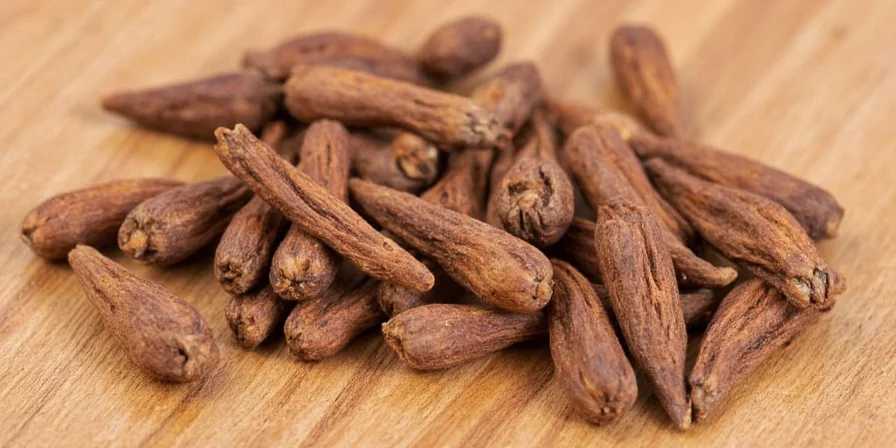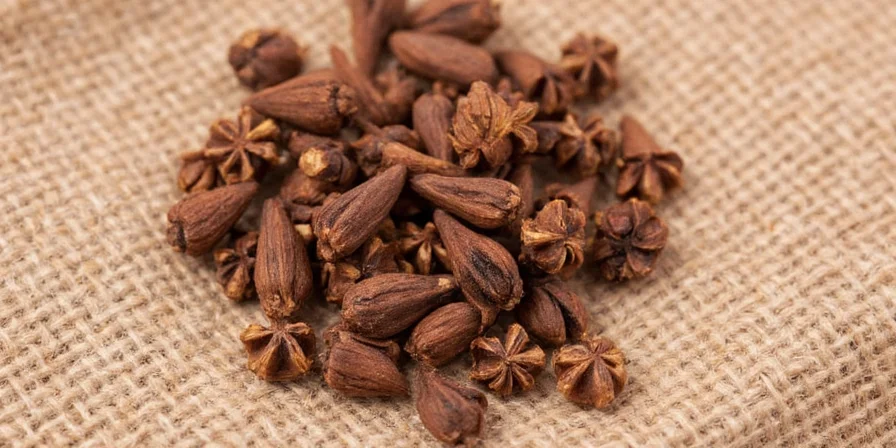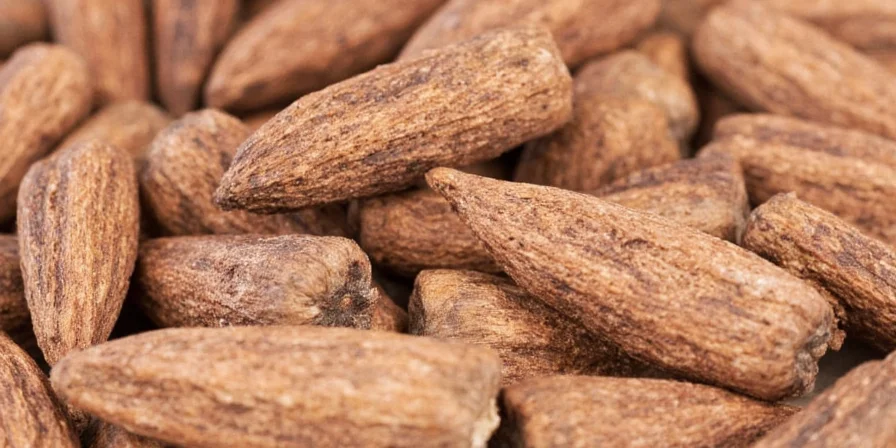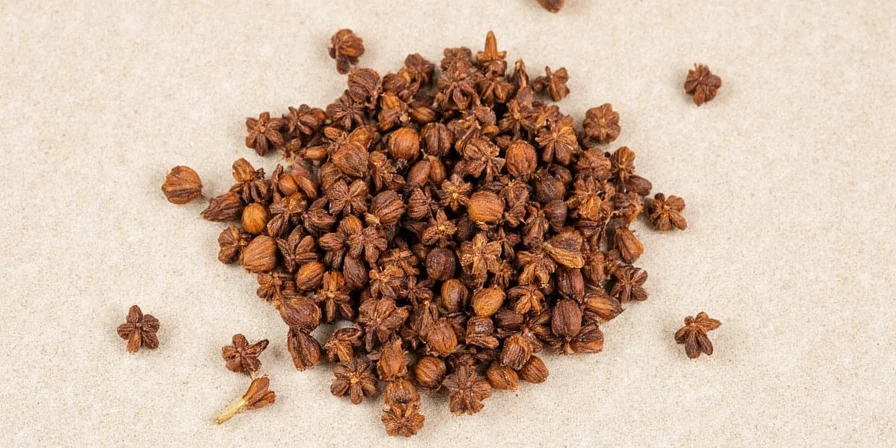Whole cloves are small but mighty spice powerhouses that can make or break your dish. If you've ever wondered how to use whole cloves properly without overwhelming your recipe, this guide delivers exactly what home cooks need: practical techniques for perfect flavor every time. Discover why chefs prefer whole cloves over ground, how many to use, when to remove them, and simple fixes for common mistakes - all explained in straightforward terms without confusing jargon.
Table of Contents
- What Are Whole Cloves and Why Use Them?
- Whole Cloves vs Ground: Key Differences You Need to Know
- Simple Techniques for Perfect Clove Flavor
- Best Flavor Combinations by Cuisine
- How to Fix Common Clove Mistakes
- Proper Storage for Maximum Freshness
- Interesting Clove Facts You Should Know
- Frequently Asked Questions
What Are Whole Cloves and Why Use Them?
Whole cloves are the dried, unopened flower buds of the clove tree (Syzygium aromaticum). Unlike ground cloves, they maintain their essential oils until heated, providing more vibrant flavor with better control. Their nail-like shape makes them easy to remove after infusing dishes with warm, aromatic notes perfect for stews, mulled drinks, and holiday recipes. This controlled release prevents the bitter, overpowering taste that often happens with ground cloves.

Natural habitat of clove trees where buds develop complex flavor compounds through tropical growth conditions.
Whole Cloves vs Ground: Key Differences You Need to Know
Ground cloves lose flavor quickly after grinding, while whole cloves stay fresh for years. This simple difference affects your cooking significantly - with whole cloves, you can control exactly how much flavor enters your dish and remove them before serving.
| Feature | Whole Cloves | Ground Cloves |
|---|---|---|
| Flavor Control | Can be removed after infusion | Mixes completely, cannot be removed |
| Shelf Life | 2-3 years when stored properly | 6-12 months before losing potency |
| Texture | No residue in finished dish | Can create grainy texture |
| Flavor Intensity | Milder, more rounded flavor | Stronger, sometimes bitter taste |

Whole cloves (left) maintain essential oils until heated, while ground cloves (right) release all flavor immediately.
Simple Techniques for Perfect Clove Flavor
Get the most from your cloves with these easy methods:
- Basic Ratio: Use 3-4 whole cloves per quart of liquid as starting point - easily adjustable by removing cloves early if too strong.
- Removal Timing: Take cloves out after 70% of cooking time to prevent bitterness from prolonged heating.
- Meat Infusion: Push cloves into meats like ham or roasts before cooking for even flavor distribution.
- Stovetop Method: Add to simmering liquids (below boiling) for gradual flavor release - never boil cloves.
- Cold Brew Option: Steep in cold liquids overnight for delicate flavor in beverages without harsh notes.

Cloves embedded in citrus create aromatic mulling combinations with controlled flavor release.
Best Flavor Combinations by Cuisine
Pair cloves successfully with these classic combinations:
- Asian Dishes: Combine with star anise and cinnamon in braises - use 3 cloves per cup of liquid.
- Middle Eastern: Pair with cardamom and cinnamon in rice dishes for warm, complex flavors.
- Caribbean: Use with allspice and ginger in stews - cloves enhance other spices without dominating.
- European Baking: Add to apple pie fillings or poached pears - 2-3 cloves per recipe is perfect.
- Winter Drinks: Combine with cinnamon sticks and orange slices in mulled wine or cider.
How to Fix Common Clove Mistakes
Solve these frequent clove problems:
- Too Much Clove Flavor: Remove all cloves immediately and add 1 teaspoon of acid (lemon juice or vinegar) per quart to balance flavors.
- Can't Find Cloves: Use a mesh spice bag for easy removal - never leave cloves in finished dishes.
- Bitter Taste: Caused by boiling cloves too long - always use gentle simmer and remove after cooking.
- Old, Weak Cloves: Test freshness by placing in water - fresh cloves sink, old ones float.
- Substituting Ground Cloves: Use 1/4 teaspoon ground for every 3 whole cloves, but add near the end of cooking.

Proper clove usage creates balanced flavor without overpowering other ingredients.
Proper Storage for Maximum Freshness
Keep cloves potent with these storage tips:
- Air-tight Container: Store in glass jar with tight lid to prevent moisture exposure.
- Dark Location: Keep away from light which degrades flavor compounds quickly.
- Cool Temperature: Store below 70°F (21°C) - heat accelerates flavor loss.
- Check Freshness: Fresh cloves should have strong aroma and sink in water.
- No Freezing Needed: Unlike some spices, cloves maintain quality at room temperature.

Proper storage in dark glass containers maintains clove potency for maximum shelf life.
Interesting Clove Facts You Should Know
Practical clove knowledge for everyday cooking:
- Historically used as natural food preservative due to antimicrobial properties.
- One of the original "spice route" commodities traded globally for centuries.
- Perfect for holiday dishes like baked ham, where cloves provide decorative and flavorful elements.
- Commonly used in chai tea blends to enhance other spices without overpowering.
- Works well with citrus - try cloves in orange halves for natural air fresheners.
Frequently Asked Questions
How many whole cloves equal ground cloves?
Use 3 whole cloves for every 1/4 teaspoon of ground cloves. This ratio works because whole cloves release flavor gradually while ground cloves disperse immediately. For best results, add ground cloves near the end of cooking since you can't remove them later.
Why do recipes call for whole cloves instead of ground?
Chefs prefer whole cloves because they provide better flavor control - you can remove them after they've infused the dish but before they become bitter. Whole cloves also maintain freshness much longer than ground versions and don't create texture issues in finished dishes.
How do I remove whole cloves from my dish?
Use a slotted spoon to carefully remove cloves before serving. For soups and stews, place cloves in a mesh spice bag before cooking for foolproof removal. In dishes like baked ham, cloves are visible and easy to pick out. Never leave whole cloves in finished dishes as they're hard to bite into.
Can I use too many whole cloves?
Yes, using too many cloves creates overpowering, bitter flavors. Start with 3-4 cloves per quart of liquid and remove them after 70% of cooking time. If you've added too many, remove them immediately and add 1 teaspoon of acid (like lemon juice) per quart to balance the flavor. You can also dilute the dish with additional liquid.
How can I tell if my cloves are still good?
Fresh cloves should have a strong, sweet-spicy aroma. Perform a simple float test: place a clove in room-temperature water. Fresh cloves sink because their essential oils make them dense, while old cloves float as oils evaporate. Also check that cloves feel firm, not brittle, and have rich dark brown color.
Conclusion: Mastering Whole Cloves Made Simple
Whole cloves offer home cooks an easy way to add professional-quality flavor to everyday dishes. By understanding the simple ratio of 3-4 cloves per quart, removing them before serving, and storing them properly, you'll consistently create balanced, delicious dishes without overpowering bitterness. These small spices deliver big flavor when used correctly - now you have the practical knowledge to use them confidently in your cooking.

Properly placed cloves enhance holiday ham with warm flavor and attractive presentation.











 浙公网安备
33010002000092号
浙公网安备
33010002000092号 浙B2-20120091-4
浙B2-20120091-4